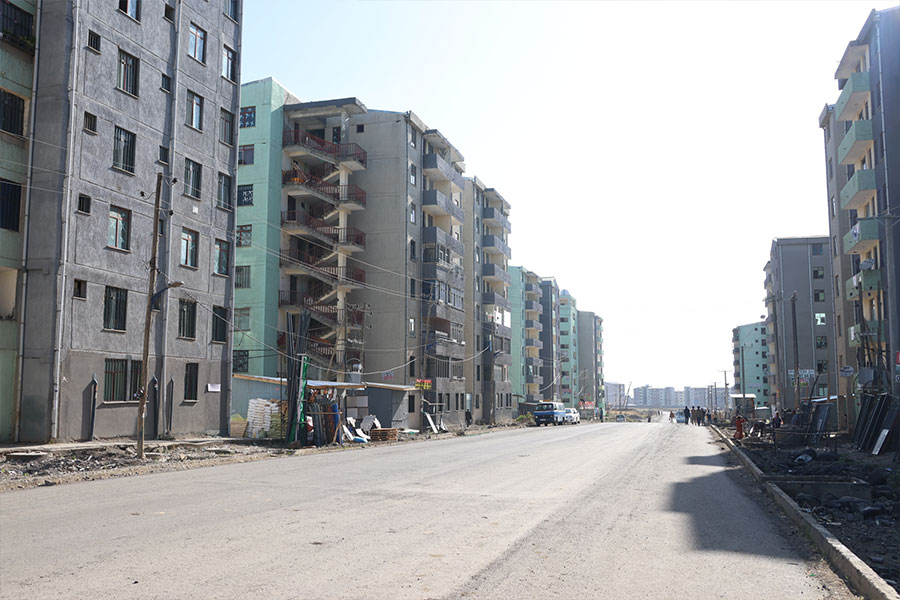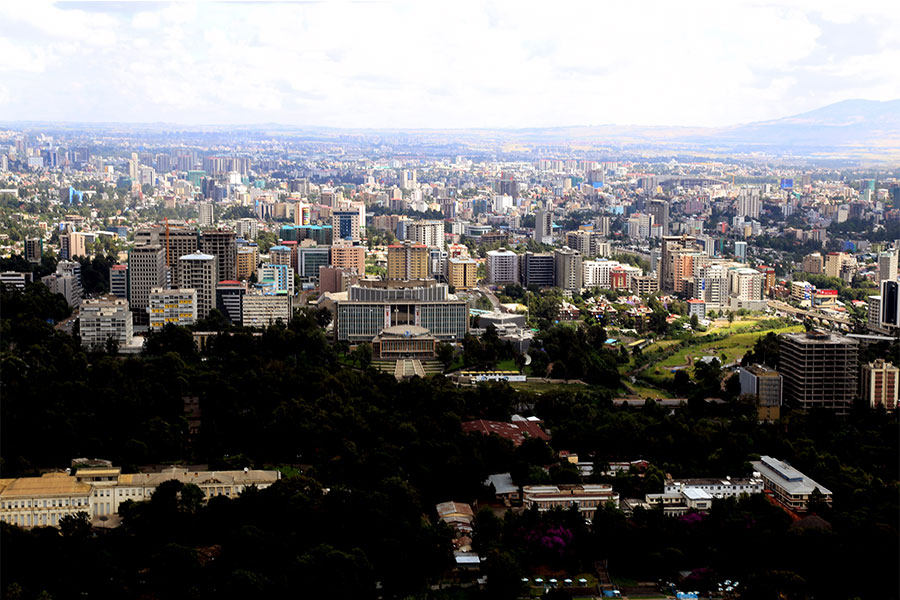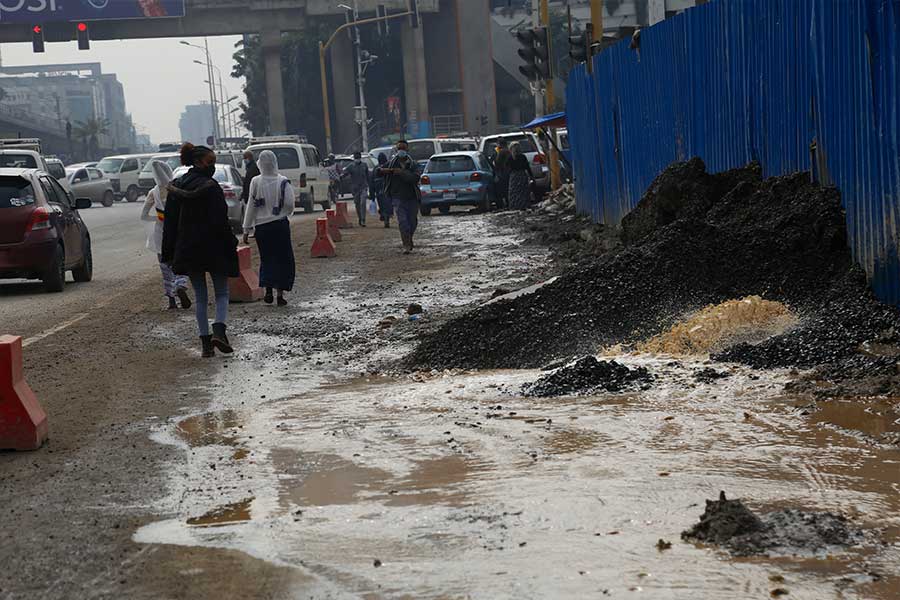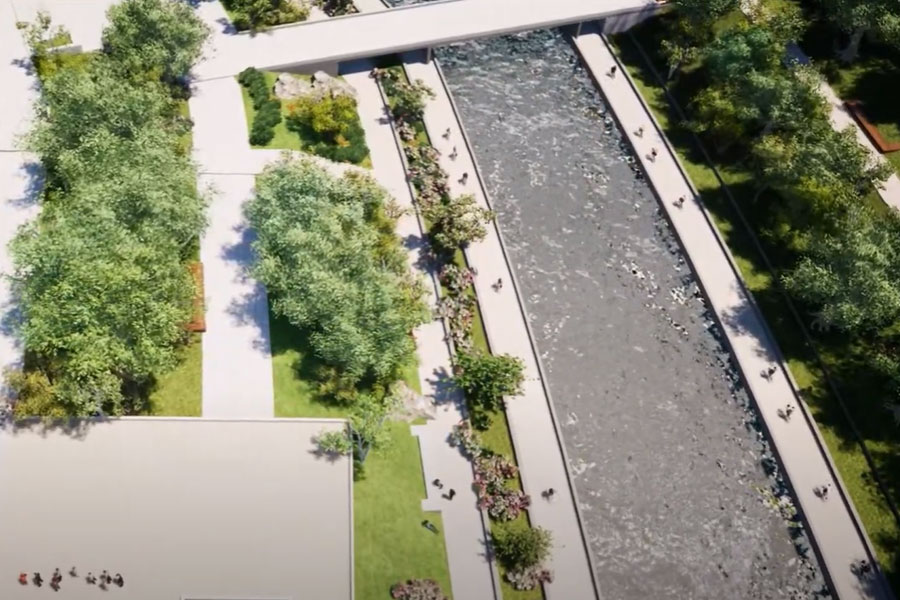
Agenda | May 11,2025
Bishop Hiruy Tsige’s family of five are new residents to the luxury development of Ropak Real Estate homes in Legetafo Legedadi town, 11 km outskirts of Addis Abeba, Oromia Regional State. It has only been a year and a half since they bought their property.
The 69-year-old member of the clergy joined many other homebuyers when he moved into his three-bedroom home that sits on a 1,000sqm plot.
Little did he know that he was also inheriting a simmering sewage overflow problem that has plagued the occupants of the luxury homes for more than ten years.
Bishop Hiruy recounts that he noticed the problem within a few months of his move at the beginning of the rainy season. There is a manhole that sits in front of his home that is apparently attached to the main sewer line connected to other homes in the development.
“Last summer the sewage overran the manhole, and we just managed to divert the flow before it entered our house,” he recalls. “I soon started to regret buying the house.”
The family avoids any walks around the house or to open the windows because of the intolerable stench and the swarming flies that buzz over the sewage, according to him.
As a result of the problem, the tenants on the other side of his home vacated the premise, and no one is staying there which has developed into another source of insecurity for his family. There have been recurring burglaries in the development in recent months.
Ropak Real Estate was established in August 1998 by two partners - Ropak International Plc, a South African company, and an Ethiopian investor.
The real estate company leased the land from the Legetafo town administration in 2000 and delivered 23 completed homes in three years.
The company constructed three and four-bedroom homes on 500Sqm and 1,000Sqm plots.
“At this time, the real estate company has delivered 357 homes with full title deeds to the owners,” said Kebede Challa, manager of Ropak Real Estate.
The Villas at Ropak Real Estate compound delivered to owners without fulfilling storm drains, street lights and appropriate fencing that would protect from burglars.
The centralised design of the septic tank was built on the premises with a future plan to develop a larger septic infrastructure on an adjacent 5,000Sqm of land. That piece of property was repossessed by the town administration when the town became bigger, according to the manager. Other town dwellers living outside the development were also affected and lodged complaints about the sewer flow to the city administration.
That followed a court action that held the company responsible, and an order was issued for the company to build a waste treatment plant that allows treated effluent to be discharged into a nearby river.
The construction of the waste treatment plant started in 2007 and became operational after two years of delay due to electrical power hookup problems. Once it came online, however, the plant failed to operate properly, which the company claims was due to theft that removed the pump and accessories from the pump house.
“Even after the construction and brief operations of the water treatment plant, the problem persisted, because the waste plant could not solve the problem,” said the previous head of Legetafo’s environmental protection office.
A group from the offices of the town administration, environmental protection, the association of the residents and the court council visited the premises and requested a professional opinion.
Experts from Addis Abeba University confirmed that the waste treatment plant was not up to standards, according to the previous head of the office.
The issue is still not resolved, because the company says the association of the residents was not supportive in maintaining the waste treatment plant, and maintenance of the plant is not possible, because the area has been fenced off by people who claim the land belongs to their families.
The association of the residents is claiming that rectifying all the problems of the sewage problem, including fencing and operating the waste treatment facility properly, is the responsibility of the company.
Meanwhile, some town residents took matters into their own hands and tried to block the manholes with stones and dirt that in return caused backflows in the sewer system with the sewage overflowing in upstream manholes.
Now, the sewage is overflowing into other parts of the development, creating a foul stench witnessed by Fortunestaff during a recent site visit.
Abebe Dinku (Prof), a civil engineer and a university lecturer with over three decades of experience, points out that both the real estate company and the owners have entered into a contract with specific terms and conditions.
Overflowed sewage at the Ropak Real Estate compound in Legetafo Legedadi town, where residents have to tolerate the foul stench and its consequences due to dysfunctional sewer system.
“The contractor should respect its terms, and the developer should act accordingly,” he said.
The septic tank should also function and operate according to the contract agreement, he argues. Even though the central septic tank is economical, it does not have the capacity to service all the homes and facilities at the development. It needs to be well designed and constructed with engineering standards and requirements, according to Abebe.
“There are a lot of ways to construct septic tanks using a single septic tank for a group of blocks, or establishing individual septic tanks for each home - the latter as a last resort,” he said.
The residents of the development are not only devastated by the problem of the failed sewage system over the last decade but are now plagued by recurrent robberies that have become a daily routine of conversation by residents.
Alem Bogale, 34, a mother of three who works in the tourism business, recalls a burglary that took place at her house.
It happened around 2:00am in the middle of the night when she was awakened by sounds of falling items in her living room.
Startled, she woke up her husband who rushed out of the bedroom as the intruders were escaping. He followed the three burglars until they hid behind a building that is under construction.
Nevertheless, he succeeded in retrieving some of their stolen possessions, including a television set, a mobile charger and a decoder, that the robbers dropped as they fled the scene.
“We called the police who came and took forensic evidence, but nothing has happened,” she said.
Such stories are related often by many residents of the developed, as it is occurring with some frequency, and as some of the homes have been burglarized repeatedly.
To reduce the recurrence of burglary, the home association hired 58 guards to protect the premises 24 hours a day.
“We contributed more than 100,000 Br to hire the guards and built watchtowers around the compound. We collect 500 Br a month from each owner to cover the expense,” said Tabor Geresu, one of the residents who had lived in the development for more than 10 years.
Strangers trespass throughout the compound all day long, claiming that the land belongs to their forefathers, according to him.
The police say there is no organised robbery in the town, but what is happening is ordinary theft and harassment of women happening everywhere else, especially in the development compound.
“The compound is not safe, as it has no fence, proper gates and no lighting,” Girma Gelan, inspector and head of the Legetafo Legedadi town police force, said. “It is up to the company and the residents to agree to build the fences for the benefit of all.”
The number of trespassers has decreased significantly in the past year as the police force has taken measures, and most of the criminals are in jail now, according to the head of police.
To alleviate the problem, some police officers have been assigned to the compound and are patrolling all day.
The residents claim that the company does not seem to take responsibility for the safety of the occupants. The guards hired by the company are not doing their jobs properly.
“That is why we created manned gates of our own and hired guards,” said one of the longtime residents of more than 17 years.
The company did not complete the infrastructure that was part of the contract that calls for fencing, storm drains, street lights, an entertainment centre and other facilities incorporated into the plan, according to him.
The manager of the company says the premises were once fenced with concrete walls and chain link fences but were vandalised. He claims that the company will cooperate if the residents agree to remedy the situation.
For the bishop and his family, it has become a daily task of cleaning and coping with the sewage overflow with no clear solutions in hand.
“I am worried about my wife and family members who are at home all day and night,” he said with desperation. “As for me, I always go out early in the morning and come back in the evening.”
PUBLISHED ON
Mar 23,2019 [ VOL
19 , NO
986]

Agenda | May 11,2025

Agenda | Apr 26,2019

Radar | Sep 06,2020

Commentaries | Dec 11,2021

Sunday with Eden | Nov 12,2022

Radar | Jul 23,2022

Viewpoints | Mar 23,2019

Radar | Jun 25,2022

Fortune News | Jan 22,2022

Radar | Nov 05,2022

Dec 22 , 2024 . By TIZITA SHEWAFERAW
Charged with transforming colossal state-owned enterprises into modern and competitiv...

Aug 18 , 2024 . By AKSAH ITALO
Although predictable Yonas Zerihun's job in the ride-hailing service is not immune to...

Jul 28 , 2024 . By TIZITA SHEWAFERAW
Unhabitual, perhaps too many, Samuel Gebreyohannes, 38, used to occasionally enjoy a couple of beers at breakfast. However, he recently swit...

Jul 13 , 2024 . By AKSAH ITALO
Investors who rely on tractors, trucks, and field vehicles for commuting, transporting commodities, and f...

Oct 25 , 2025
The regulatory machinery is on overdrive. In only two years, no fewer than 35 new pro...

Oct 18 , 2025
The political establishment, notably the ruling party and its top brass, has become p...

Oct 11 , 2025
Ladislas Farago, a roving Associated Press (AP) correspondent, arrived in Ethiopia in...

Oct 4 , 2025
Eyob Tekalegn (PhD) had been in the Governor's chair for only weeks when, on Septembe...